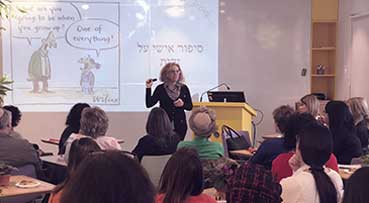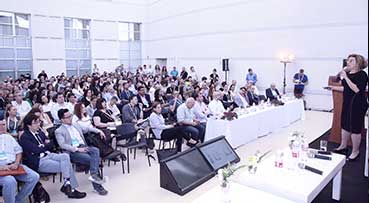Since the onset of the pandemic, employees have found their voice, and organizations are realizing the importance of listening. This is a worldwide phenomenon, and it’s particularly pronounced in our region due to the ongoing war.
It all began with the “Great Resignation,” a tidal wave of mass exits as employees, recognizing the brevity of life, reassessed what they expected from their jobs. This led to the “Great Return,” where workers flocked to new companies that aligned with their redefined expectations. Then came “Quiet Quitting,” which was less about quitting and more about employees and employers collaboratively establishing a new normal without the need for quitting. Most of the world is still navigating this delicate negotiation between workforce and workplace. However, here in Israel, working@war, our situation is unique. The war has accelerated this evolution, pushing the dialogue between individuals and organizations further along the spectrum of expectations, and ushering in a demand for unprecedented workplace norms.
Meet the new paradigm of employee engagement, or as Deloitte terms it: Worker Agency. This concept, gaining traction globally, is especially relevant in contexts marked by uncertainty and change. In today’s evolving work landscape, this translates into greater autonomy over employees’ work modalities—choosing when, where, and how they work to best align with their personal lives, productivity preferences, and work styles.
Employees are also seeking a stake in decision-making processes, from shaping workplace policies to influencing organizational culture. They desire opportunities for development tailored to their interests, strengths, and career aspirations, rather than merely serving a manager’s agenda or the organization’s immediate needs. Moreover, they are advocating for a holistic approach to well-being, one that ensures a harmonious balance between professional demands and other life aspects, acknowledging the varied needs and circumstances of each individual.
In essence, employees are demanding to be seen, heard, respected, and responded to. They’re no longer willing to compromise on these fronts. Empowered like never before, they’re now in a position to compel organizations to pay attention.
The labor shortage we’re witnessing stems not just from supply and demand imbalances, but from a profound shift in expectations, particularly among younger generations. Deloitte’s Global Millennial and GenZ Survey, for instance, reveals that the “Great Resignation” is far from over. Between a quarter and forty percent of young workers anticipate leaving their current roles within two years, with a third of them prepared to do so even without a backup plan. The primary driving forces? A desire for a better work-life balance, development opportunities, and a need for alignment with their values. In fact, a third of the young workforce in junior positions and half of those in managerial roles have already turned down positions or assignments that clashed with their personal values.
Today’s employees feel a newfound sense of power, responsibility, and access to tools that enable them to stand firm on what matters to them. The shift towards digital workspaces has opened up alternative career paths. In the U.S., freelancers are becoming an increasingly significant segment of the workforce, expected to make up 50% of the labor market within the next three years, making it the predominant employment model. Among younger workers, this trend is almost the norm. The primary allure? Economic stability and the freedom to choose where, when, and on what terms they work.
As their choices widen, employees are increasingly leveraging their influence to mold organizational behavior. Globally, we’ll see them continue to push companies to realign their values, strategies, policies, and management styles. In Israel working at war, this shift is currently manifesting in the rallying cry of “we’re here for our country, be here for us!” This sentiment resonates whether it’s reservists who’ve left behind faltering businesses, spouses of reservists juggling double burdens at home with reduced work availability, or those who are displaced or have been personally affected in various ways due to the war. The message is crystal clear: the unique needs of individuals cannot be overlooked in favor of uniform procedures and policies, especially not in the name of shareholder profits.
Yet, there are genuine dilemmas in balancing business operations with the realities of life@war. On the surface, these appear as conflicting needs. This is precisely the challenge that calls for cultivating a culture of dialogue, a space where these complex issues can be navigated and addressed.
From Monologue to Dialogue:
The era of monologue is typified by employees airing grievances on social networks while managers huddle in conference rooms. However, if you aim to truly engage employees in strategy, policy, and organizational connectivity, it’s imperative to include them in the conversation, seek their ideas, and consider their perspectives.
A practical approach is to re-evaluate the role of employee. These communities, previously managed as part of organization’s wellbeing efforts, must now become a central management tool. This shift acknowledges that managing work is fundamentally about managing people, empowering them to steer their own work. In Israel, working@war, these employee communities will be instrumental in addressing difficulties and crafting solutions. But even without a war, in the evolving work landscape, they will assist in managing all aspects of organizational life, including purpose, development, career paths, processes, and procedures. Above all, these communities are pivotal in fostering connectedness and shaping a culture that’s responsive to the changing nature of work.
From Guidance to Co-Creation:
Merely engaging in dialogue isn’t sufficient; there must be a shared responsibility in devising solutions. When employees are not committed to the solutions, it becomes easy for them to criticize management policies. However, anyone who has been part of management discussions understands the complexity of these issues and the far-reaching implications of every decision. Thus, involving employees in solution creation not only shares the responsibility but also opens up new avenues for problem-solving.
In Israel, this is coming up through the example of the reservists’ spouses, representative of all scenarios where employees are unable to work as usual during this period. The challenge is evident. Prolonged Work@War tests the limits of flexibility and confronts us with the need to balance resource management against fairness and equity for those who are either contributing more or bearing a heavier load. At the same time, it raises questions about organizational culture, mutual obligation, and perhaps even humanity towards those impacted by the crisis, especially those paying a personal price for their family members’ significant contributions.
A culture of dialogue approaches this problem differently. Instead of crafting a one-size-fits-all policy at the management level, it invites collaborative problem-solving with active employee involvement. Employees engaged in both identifying problems and crafting solutions are unlikely to be one-sided. They become more cognizant of the challenges faced by managers, their teams, and the organization at large.
From Response to Participation:
In the slower-paced pre-pandemic world, recognizing a problem, assigning responsibility, designing decision-making processes, preparing presentations, and finally communicating policy changes was a lengthy affair. The pandemic upended this process, forcing us to implement first and understand the consequences later, often leading to policy revisions as conditions changed. Post-pandemic, the attempt to revert to the old process proved ineffective. For example, organizations that decided on the number of work-from-home days found employees resistant to these policies. Similarly, in Israel, as the war transitions from an emergency situation to a prolonged reality, the initial quick responses have reverted to traditional top-down management, often misaligned with on-the-ground realities. This leads to numerous policy exceptions or, worse, employees venting their frustrations on social networks.
A better approach is to revert to a more collaborative policy-making process, sometimes after actions have already been taken. Such policies should be viewed as frameworks, granting managers the flexibility to respond appropriately to each situation. This mirrors how we typically operate around work: setting goals and allowing managers flexibility in resource, budget, and schedule management. The same approach should apply to people management, giving managers the latitude to respond to their team’s needs.
For instance, instead of a blanket gesture like the welfare department sending flowers to all spouses of reservists, managers could engage in a participatory dialogue with their teams. This would help identify specific challenges and direct budgets towards more practical support, such as financing childcare, meals, and other services. Such tailored assistance not only eases the physical and emotional burden on the employee but also fosters a more supportive and responsive workplace culture.
The evolving landscape of employee engagement is reshaping traditional work dynamics, centering them around the employee. It acknowledges that when employees have more control and choice in their work lives, it leads to better outcomes for both the individual and the organization. This is a global trend, and while the rest of the world may have the luxury of time to ponder, debate, and gradually embrace this shift, we don’t. In high-pressure situations like work@war, responding to these changes becomes even more urgent. Globally, employees are asserting that they shouldn’t have to bear unnecessary burdens for their work. For us in Israel, the stakes are even higher. Our workers, who often face immense personal, sometimes even life-threatening risks, are demanding a partnership in all matters affecting them, both at work and in life. It’s imperative that we listen and respond accordingly.

![large-AX1A2125-2[1]](https://niritcohen.com/wp-content/uploads/elementor/thumbs/large-AX1A2125-21-pnzedcs72atx5aeurqytqdiihxixlq02re9mlz805s.jpg)






